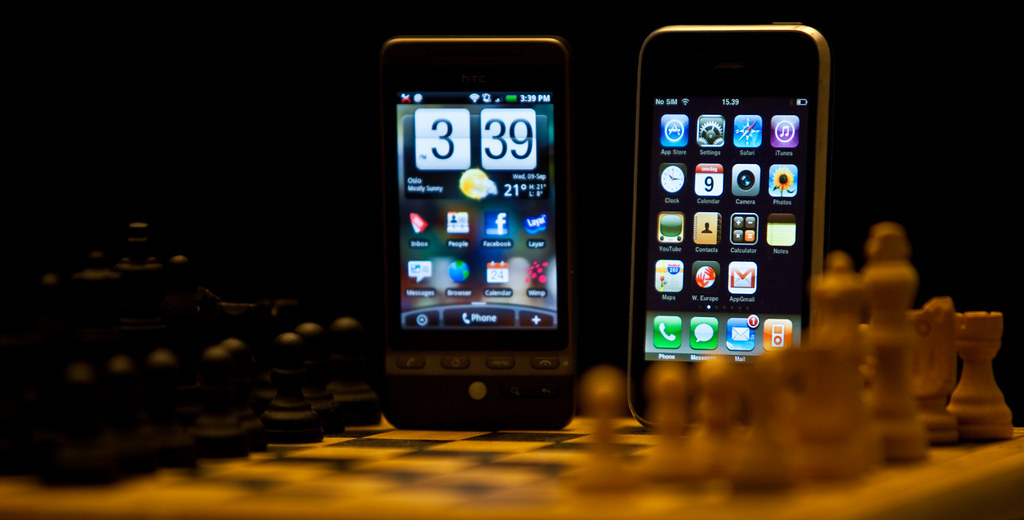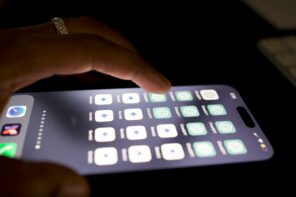I once asked my roommate if I should go out with this guy I just met. In order to reach my decision, we listed some pros and cons about him, and eventually we noted having an android was considered a drawback, a red flag.
But why? Why does it matter whether he has an iPhone? It’s a question that keeps coming back to me, revealing how iPhones go beyond being just a popular tech brand. They’ve somehow become an indicator of a person’s positive social status. Apple’s presence extends from product placements in on-screen entertainment to symbolizing trendiness and financial success. It’s become more than a phone; it’s an indispensable item that influences our perceived worth, success, and acceptance.
The fact that the absence of an iPhone is noticeable raises questions about the influences of technology on our social preferences. So, are androids now a cause for concern?
[iPhones have] somehow become an indicator of a person’s positive social status.
With Apple’s rise in popularity over the past two decades, its systemic layout and marketing strategies have undergone significant evolution. The design has become exclusive, limited to communication within the Apple ecosystem. Features such as internet texts restricted to Apple iCloud software users and exclusive apps available only on the Apple Store create a sense of unity among Apple users, while simultaneously casting non-Apple users as outsiders in this software realm. This exclusivity contributes to an air of elitism, fostering a perception among Apple users that their devices stand above the rest.
What adds an intriguing layer is the fact that certain updates, like widgets and increased battery lifetime, were initially developed for Google phones and Androids long before Apple incorporated them into its system. Apple users are glorifying the “new and advanced” systems that many other phone brands have had before, but those brands are still looked down upon because they’re not as trendy and admired as Apple.
Numerous movies and television shows underline these conditions as well. Many entertainment sources only feature Apple being used by protagonists, conveying a subtle message that Apple products align with positive attributes. In fact, this was mentioned by Knives Out director, Rian Johnson, in an article by Business Insider stating; “While Apple allows for product placement of Macs and iPhones in movies, the company has a golden rule: bad guys can’t have Apple products.” Whether it’s an Android cellphone utilized by a less-than-ideal character, or an upscale iPhone being expertly used by a charming hero, with these visual hints Apple manages to further engrave the idea that its products are aligned with success and desirability.
In addition, when looking at the numbers regarding our generation (Gen Z), Apple skyrockets in popularity. Another article done by Business Insider demonstrates the popularity of Apple and how deeply habituated our generation is by this brand, “Out of the thousands of teenagers surveyed, 87% said they own an iPhone, and 88% of them expect the iPhone to be their next phone.” This preference is more about a feeling of unity than it is about functionality. There’s a real fear of being left out and of sticking out among young people. In this context, having a phone that isn’t an Apple product becomes more than just a matter of preference; it could also pose a social barrier.
…Apple manages to further engrave the idea that its products are aligned with success and desirability.
As an Apple user myself, I can’t help but wonder whether I chose Apple for its functionality or simply out of fear of potential exclusion for having a non-Apple phone. Certainly, having a phone or any form of technology is a privilege not to be taken lightly. Yet, the existence of such a shallow divide in our society between Apple and other phone brands is an odd situation. It’s a common scenario, yet surprisingly unaddressed, where people tend to exclude and feel more entitled based on the brand of their phone.
Looking at the bigger picture, those fortunate enough to have phones should appreciate the ability to communicate and access information readily, regardless of the brand held in their hands. The preference for Apple products extends beyond a socially driven condition; it presents a complex link between Apple’s marketing strategy and our natural desire to fit in and unify.







